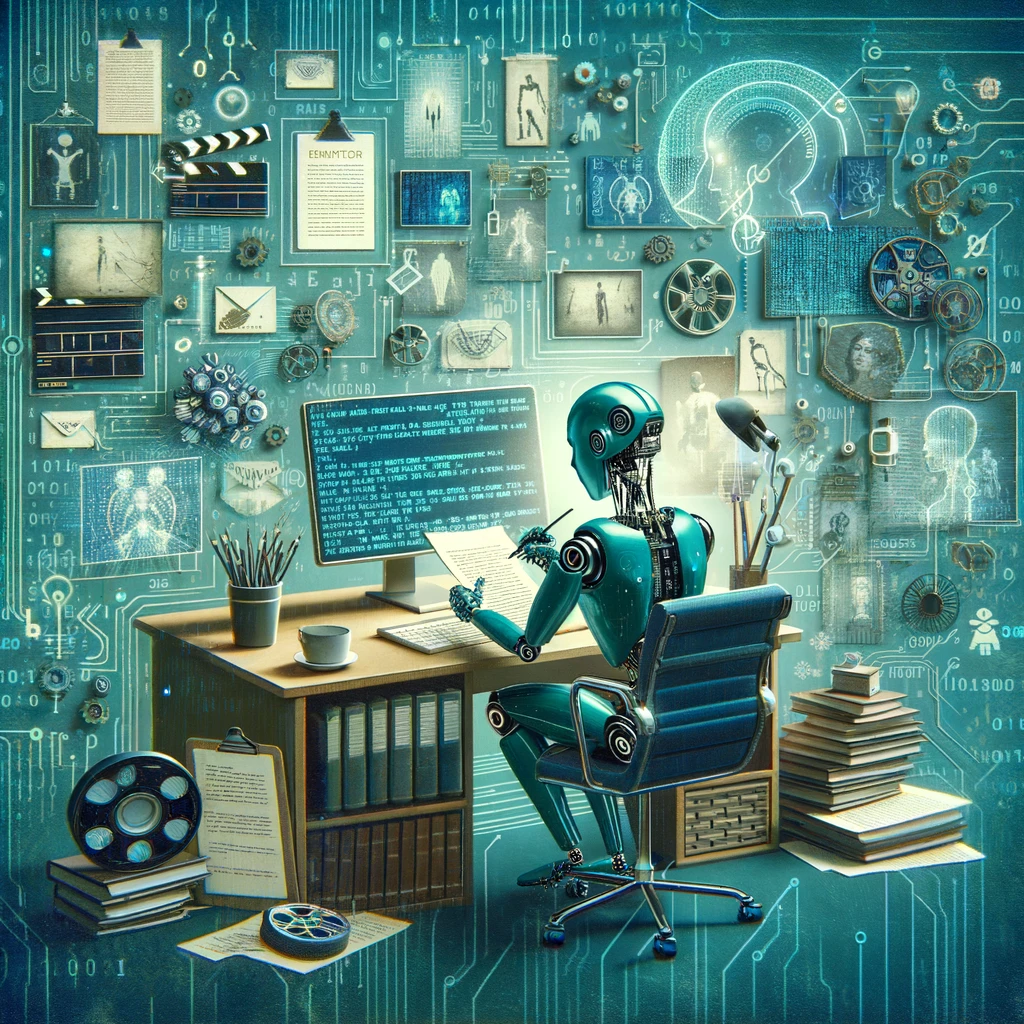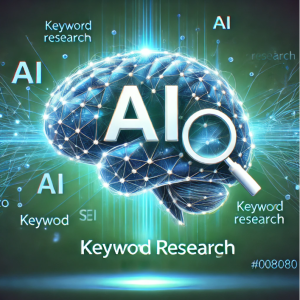Role of AI in Scriptwriting in 2025
In an era where technology seamlessly intertwines with daily life, Artificial Intelligence (AI) has emerged as a groundbreaking force, revolutionizing industries far and wide. AI, known for its ability to learn, analyze, and make decisions, is no longer confined to the realms of science and industry. Its influence has remarkably extended into the creative fields, where it’s reshaping the traditional boundaries of art and storytelling. Among these creative frontiers, scriptwriting, a cornerstone of the film and television industry, is witnessing a significant transformation. The emergence of AI in scriptwriting is a testament to how technology can not only coexist but also enhance human creativity. AI-driven tools and software are now capable of assisting writers in plot development, character creation, and even refining dialogues, ushering in a new era of storytelling. The purpose of this blog is to delve into the evolving role of AI in scriptwriting. We’ll explore how AI is changing the landscape of this art form, from the initial stages of drafting a script to the final touches that bring a story to life. This exploration aims to uncover the potential of AI as a collaborator in scriptwriting, highlighting both its capabilities and the challenges it presents. Join us as we navigate through this intriguing convergence of AI and scriptwriting, where technology meets creativity.
The Evolution of Scriptwriting and AI
Scriptwriting, an art form integral to the world of entertainment, has a storied history that dates back to the earliest days of theater and film. Traditionally, scriptwriting has been a purely human endeavor, involving the meticulous crafting of narratives, characters, and dialogues. The process was characterized by manual efforts – writers pouring over typewriters or notebooks, painstakingly developing plots and characters that could captivate audiences.
This traditional approach to scriptwriting was both time-consuming and intensely personal, relying heavily on the writer’s creativity, experience, and understanding of human emotions and storytelling techniques. The journey from an initial idea to a fully fleshed-out script often involved numerous revisions and could take months or even years. Collaboration was typically face-to-face, with writers often working in writers’ rooms or through direct feedback from directors and producers.
The advent of AI technology in creative writing marked the beginning of a significant shift. Early stages of AI in this realm were basic. Initial forays involved simple algorithms capable of generating short pieces of text based on predetermined rules or patterns. These early AI tools were more novelty than practical application, lacking the sophistication to understand or replicate the nuances of human storytelling.
However, the evolution of AI in scriptwriting has been rapid and transformative. Modern AI writing tools are equipped with advanced algorithms based on Natural Language Processing (NLP) and machine learning. These tools can analyze extensive databases of existing scripts and literature to learn storytelling patterns, character development, plot progression, and dialogue styles.
Now, AI can assist in various stages of scriptwriting. It can generate story ideas, propose plot twists, develop character profiles, and even suggest dialogue options. AI’s role in scriptwriting isn’t just limited to ideation – it can also analyze scripts for pacing, structure, and emotional impact, offering suggestions for improvement.
This integration of AI into scriptwriting represents a blend of traditional narrative crafting with technological innovation. AI tools offer scriptwriters the ability to streamline the creative process, providing them with an unprecedented level of data-driven insights and suggestions. However, these tools do not replace the essential human element – the empathy, experience, and creative intuition that form the core of compelling storytelling. Instead, AI has become a collaborator, augmenting the scriptwriter’s abilities and transforming the art of scriptwriting into a more efficient and dynamic process.
How AI is Used in Scriptwriting
The integration of Artificial Intelligence (AI) into scriptwriting has opened up a realm of possibilities, transforming how scripts are conceived, developed, and refined. AI’s role in scriptwriting spans various functions, each enhancing different facets of the creative process.
Specific Functions of AI in Scriptwriting
- Plot Generation: AI tools can generate plot outlines based on specific genres or themes. By analyzing vast collections of existing narratives, AI can suggest unique plot structures, potential conflicts, and even thematic elements, providing a foundational scaffold for writers.
- Character Development: AI assists in creating detailed character profiles, including backstories, personality traits, and motivations. These tools can suggest complex, multidimensional characters that add depth to the narrative.
- Dialogue Creation: AI is capable of generating dialogue snippets. By learning from countless script examples, AI tools can produce dialogues that are stylistically consistent with the characters’ personalities and the script’s overall tone.
Popular AI Tools and Software in Scriptwriting
- Scriptbook: Offers deep analysis and predictive insights on a script’s potential success, including audience reception and box office performance.
- ShortlyAI: Known for its ability to assist in creative writing, including story and dialogue development.
- Sassbook AI Writer: Useful for generating creative content, including story ideas and narrative elements.
AI in Brainstorming and Developing Story Ideas
AI’s role extends into the brainstorming phase of scriptwriting. AI tools can serve as a creative partner, offering a stream of ideas, scenarios, or even visual elements to spark inspiration. For instance, when faced with writer’s block, a scriptwriter can input basic ideas or desired themes into an AI tool, which then generates multiple story directions
Benefits of AI in Scriptwriting
The integration of Artificial Intelligence (AI) in scriptwriting has brought about a paradigm shift in the way narratives are constructed and refined. Here are some of the key benefits that AI offers in the field of scriptwriting:
- Increased Efficiency: AI significantly speeds up the scriptwriting process. It can quickly generate ideas, plot elements, and character descriptions, allowing writers to focus on fleshing out the story and refining the details. This can be particularly beneficial for meeting tight deadlines or managing multiple projects simultaneously.
- Innovation in Storytelling: AI can introduce writers to a plethora of novel ideas and perspectives that they might not have considered. By analyzing a vast array of existing content, AI can suggest unique plot twists, character arcs, and thematic elements, thereby injecting fresh creativity into the storytelling process.
- Overcoming Writer’s Block: One of the most significant advantages of AI in scriptwriting is its ability to assist writers in overcoming creative blocks. When writers struggle to progress with a story, AI can offer suggestions and alternatives, helping to reignite creativity and maintain the flow of writing.
- Audience Preference Analysis: Advanced AI tools are capable of analyzing audience preferences and current market trends. This means scriptwriters can gain insights into what type of content is resonating with audiences, allowing them to tailor their scripts to meet these preferences, thus increasing the likelihood of success.
- Script Editing and Formatting: AI assists not just in the creation of content but also in its refinement. AI tools can help edit scripts for grammar, punctuation, and style, ensuring that the final product is polished and professional. They can also assist in correctly formatting scripts, which is crucial in adhering to industry standards.
- Enhancing Character Development: AI can analyze a wide range of character traits and archetypes, offering scriptwriters diverse and complex character profiles. This can aid in developing more nuanced and relatable characters.
- Predictive Analysis for Success: Some AI tools are equipped to analyze scripts and predict their potential success based on various factors like storyline, character appeal, and market trends. This can be invaluable for writers and producers in making informed decisions about which projects to pursue.
In conclusion, AI in scriptwriting is not just a technological advancement; it’s a creative partner that enhances the writing process. By improving efficiency, fostering innovation, and providing valuable insights, AI tools are becoming an indispensable asset for scriptwriters. However, it’s important to remember that AI is a tool to assist and enhance the creative process, not to replace the unique and irreplaceable human touch that lies at the heart of great storytelling.
Role of AI in Scriptwriting: Challenges and Limitations
While AI has brought a new dimension to scriptwriting, it’s not without its challenges and limitations. These issues mainly revolve around concerns of originality, creative control, and the understanding of complex human elements.
- Concerns About Originality: One of the primary concerns with AI in scriptwriting is the risk of producing content that lacks originality. Since AI tools often rely on existing data and trends to generate scripts, there’s a potential for the output to be derivative or too formulaic. This can lead to scripts that feel uninspired or lack the unique touch that only human creativity can provide.
- Creative Control: AI’s involvement in scriptwriting sometimes raises questions about creative control. Writers might feel that relying too heavily on AI could diminish their artistic input and lead to a final product that doesn’t fully reflect their vision or voice. Finding the right balance between AI assistance and human creativity is crucial to maintain the integrity of the script.
- Understanding Complex Human Emotions: AI, despite its advancements, still struggles to grasp the subtleties and complexities of human emotions and relationships. The depth and nuances of characters’ interactions, emotional development, and the cultural context of the story can be challenging for AI to authentically capture and convey.
- Cultural Nuances in Storytelling: Storytelling is often deeply rooted in cultural contexts and sensibilities, which AI might not fully comprehend or accurately represent. Scripts that involve specific cultural themes, idioms, or humor may require a human writer’s touch to ensure authenticity and sensitivity.
- Risk of Homogenization: There’s a risk that the widespread use of AI in scriptwriting could lead to a homogenization of content, where scripts start to resemble each other in structure and theme. This could potentially stifle diversity and innovation in storytelling.
- Dependency and Skill Erosion: Over-reliance on AI tools for scriptwriting might lead to a dependency that could erode the traditional skills of scriptwriters, such as dialogue crafting, plot structuring, and character development.
To overcome these challenges, it’s important for scriptwriters to use AI tools judiciously, ensuring that they complement but do not overpower the human element of scriptwriting. Writers should leverage AI for assistance in brainstorming, structural organization, and initial drafting, but the core of storytelling – the emotional depth, cultural nuances, and original creativity – should remain firmly in the hands of the human writer. This balanced approach can harness the benefits of AI while preserving the essence and artistry of traditional scriptwriting.
AI and the Future of Scriptwriting
The integration of AI into scriptwriting is not just a fleeting trend; it’s a harbinger of profound changes in the way narratives are crafted for film and television. As we look to the future, AI’s role in scriptwriting is poised to expand and evolve in several intriguing ways.
- Enhanced Collaborative Potential: AI’s future in scriptwriting is likely to be characterized by a more collaborative relationship with human writers. AI can serve as a creative assistant, offering suggestions and alternatives that writers might not have considered. This collaboration could lead to more innovative and diverse storytelling, as AI brings data-driven insights and writers contribute their innate creativity and emotional intelligence.
- Refinement of AI Capabilities: As AI technology advances, its ability to understand and mimic human emotional nuances and cultural contexts will improve. This means AI-generated scripts will become more sophisticated and indistinguishable from those written by humans in terms of emotional depth and cultural relevance.
- Customization for Audience Preferences: AI might be used to tailor scripts to specific audience demographics or preferences, using data analytics to predict what kind of stories, characters, and themes will resonate most with viewers. This could lead to more targeted and engaging content in the film and television industry.
- Impact on the Production Process: AI could influence not just the writing of scripts but also the entire production process. For example, AI could suggest scene settings, camera angles, and even casting choices based on the analysis of successful movies or series, thereby streamlining the production process and increasing the likelihood of commercial success.
- Diversification of Content: As AI assists in breaking down complex data and trends, it could lead to the exploration of new genres and storylines, diversifying the content available to viewers. This could open doors for more experimental and niche content that might not have been pursued otherwise.
- Democratization of Scriptwriting: AI tools could make scriptwriting more accessible to aspiring writers who lack formal training or industry connections. By democratizing the scriptwriting process, AI could uncover new talent and bring fresh perspectives to the industry.
- Ethical and Authorship Questions: The future will also need to address the ethical implications of using AI in creative processes. Questions of authorship and originality will become more prominent as AI plays a larger role in content creation.
In summary, AI’s future in scriptwriting is one of immense potential and transformative impact. By enhancing the collaborative process between AI and human writers, the film and television industry could witness a new era of storytelling that is both data-informed and emotionally resonant. However, navigating this future will require a careful balance, ensuring that AI serves as a tool to enhance human creativity rather than replace it.
Balancing AI and Human Creativity
In the realm of scriptwriting, the symbiosis between AI and human creativity is not just beneficial but essential. Balancing these two forces is key to harnessing the full potential of AI in enhancing storytelling while preserving the unique human touch that lies at the heart of great scripts. Here are some insights on how scriptwriters can strike this balance effectively:
- Use AI as a Starting Point: Consider AI tools as a springboard for creativity. Let AI generate ideas, plot points, or character outlines, but use these as initial inspirations rather than final products. The human writer’s role is to take these AI-generated elements and infuse them with depth, emotion, and personal creativity.
- Maintain Creative Control: While AI can offer suggestions and alternatives, the ultimate decision-making should rest with the human writer. This means critically evaluating AI-generated content and modifying it to align with the script’s vision and goals. Scriptwriters should ensure that the narrative remains authentic and true to their creative voice.
- Human Oversight in Editing: AI can be invaluable in editing scripts for grammar, syntax, and even certain structural elements. However, human oversight is crucial to ensure that the changes maintain the script’s intended tone and emotional impact. Writers should review and fine-tune AI-suggested edits to ensure they enhance the script rather than detract from it.
- Understanding AI’s Limitations: Recognize that AI, despite its advanced capabilities, lacks true emotional intelligence and cultural awareness. Writers should be mindful of these limitations, especially when dealing with complex emotional narratives or scripts that delve into specific cultural contexts.
- Collaboration, Not Replacement: View AI as a collaborative partner rather than a replacement for human creativity. Use AI to handle more mundane or data-driven aspects of scriptwriting, such as market analysis or formatting, freeing up time for writers to focus on the creative aspects of the script.
- Adapting to AI Feedback: Some advanced AI tools can provide feedback on aspects like audience engagement or plot coherence. Scriptwriters should adapt to this feedback where appropriate, using it to refine their scripts while retaining their original vision.
- Staying Updated with AI Developments: As AI technology continues to evolve, so should the scriptwriter’s approach to using it. Staying informed about the latest AI tools and their capabilities can help writers make the most of this technology.
In short, the key to balancing AI and human creativity in scriptwriting lies in recognizing and leveraging the strengths of both. While AI offers efficiency, data-driven insights, and novel ideas, it’s the human writer who brings emotional depth, cultural nuance, and creative storytelling to the script. This balanced approach can lead to more innovative, engaging, and successful scripts in the film and television industry.
Explore AI and the Future of Technical Writing
Role of AI in Scriptwriting: Conclusion
In our exploration of the role of AI in scriptwriting, we’ve navigated through the transformative impact AI has on this creative field. From being a tool for generating initial ideas and assisting in plot development to its role in character creation and dialogue enhancement, AI is redefining the scriptwriting process. We’ve seen how AI can increase efficiency, provide novel storytelling angles, and assist in overcoming writer’s block, all while offering insights into audience preferences and trends.
However, this journey with AI is not without its challenges. Concerns about originality, creative control, and the ability of AI to fully grasp complex human emotions and cultural nuances remain at the forefront. Balancing AI tools with human creativity is essential, with the scriptwriter maintaining the ultimate control over their narrative and vision.
As we look to the future, AI’s role in scriptwriting is poised for further growth, promising more sophisticated collaboration with human writers. This partnership holds the potential to unlock new levels of creativity and innovation in scriptwriting. Yet, the art of storytelling will always need the human touch – the empathy, intuition, and personal experiences that AI cannot replicate.
The evolving world of scriptwriting, with AI as a significant contributor, is an exciting landscape of possibilities, blending the best of technology and human creativity.
Join the Discussion: Your Experience with AI in Scriptwriting
Have you dabbled in the world of AI-driven scriptwriting? Do you see AI as a creative ally or a challenge to traditional storytelling? We invite you to share your experiences, thoughts, or any queries you have about integrating AI into your scriptwriting process. Your insights into how AI is shaping your narrative techniques or your views on the future of AI in creative writing fields can spark an enlightening discussion. Let’s delve into the fascinating interplay between AI and human creativity in the art of storytelling!




